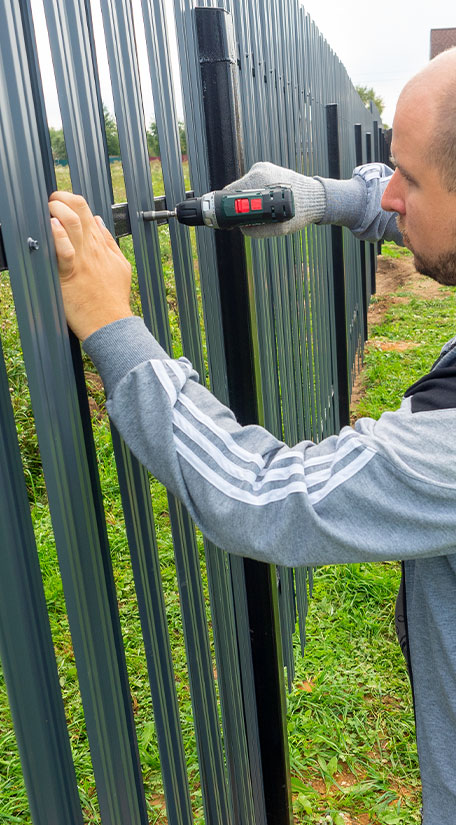South Carolina's Best Fence Company for Privacy, Protection, and Peace of Mind
Most homeowners agree that one of the best-looking, multi-purpose additions to a house is having a quality fence installed around the property. When it comes to aesthetics, affordability, and practicality, few upgrades are as popular as a new fence. They help safeguard your property when you're away, can keep your kids or pets safe and sound in your yard, and even prevent neighborly hazards from happening.
When built by professional fencing contractors in Charleston, SC residential fences can add curb appeal and resale value to your home, too. Whether you're looking to secure farm animals or want a little more privacy from your neighbors, installing a fence is a great, useful idea. When it comes to investing in your home, it's important you work with a trusted fencing company with years of experience. That's where Five Star Fencing comes in.
Our top-rated fencing company has built a reputation for building the most durable, attractive fences in metro Charleston, SC. Our model is simple: give our loyal customers the highest quality fence products at reasonable prices, installed by reliable fencing contractors in Charleston. Unlike some fence installation companies, we have built our reputation on hard work and true value. We strive to go the extra mile for our clients and do so with a friendly smile and helpful advice.
When you hire Five Star Fence Company for your fence installation project, know that you are working with the very best in the business. We take our work seriously because you trust us with the privacy, protection, and curb appeal of your home or business.
Fencing Contractors
- South Carolina's Best Fence Company for Privacy, Protection, and Peace of Mind
- The Premier Residential Fencing Company in Charleston, SC
- The Most Popular Residential Fence Designs in Charleston, SC
- Benefits of Fencing in Your Residential Property
- The Top Commercial Fence Contractor in Charleston, SC
- Quality Workmanship. Unmatched Fence Installation in Charleston, SC
When you work with Five Star Fence, you can always count on:
- The Finest Construction and Fence Installation in Charleston
- All Jobs Completed with Workers' Comp and General Liability Insurance
- Residential and Commercial Fencing Services
- Prompt, Reliable Installation
- Long-Term Fence Dependability
- Fencing Options Like Aluminum, Privacy, Picket, Chain Link, & More
- Free Quotes
- Friendly Service
We're proud to offer the same level of service for all our customers - whether they have a large commercial fencing project to
complete or a two-bedroom home that needs a privacy fence.
The Premier Residential Fencing Company in Charleston, SC
Whether you're looking to define property lines, enhance your home's security, boost curb appeal, or all three, having a fence built for your home is a great choice. Whether you choose a classic picket fence or a sturdy aluminum alternative, Carlina Fence Company has the tools, experience, and expert team to install a high-quality fence for your home.
If you know that you need a new fence but are unsure of where to start with the process, ask yourself these questions:
- Where will your fence be placed? Backyard? Front Yard? Both?
- What are concerns will a fence help alleviate? Privacy Security? Curb Appeal?
- Do you prefer certain fencing materials like metal or wood?
- Do you want a certain kind of fence like chain link or picket?
- What is your budget?
Once you can answer one or two of those questions, it's time to give Five Star Fence Company a call. Our knowledgeable, friendly team of fencing experts can help narrow down your affordable fencing choices. When you're ready, we'll take a trip to your home and provide a thorough, hassle-free quote for your consideration. Once we know the details and scope of your fence installation, we'll get to work building you a beautiful, sturdy fence that will last for years to come.
But with so many different fence styles available, it can be hard to choose which fence will be the perfect fit for your home. To help you select the right fence, consider these popular styles:

The Most Popular Residential Fence Designs in Charleston, SC
Usually, fences fall into three categories: decorative, functional, and privacy. Whether your plan is to use your fence for pet safety, family privacy, or property lines, Five Star Fence has plenty of options to choose from. With a myriad of materials like aluminum, wood, and vinyl, you're sure to find the perfect fence style for you and your family.

Privacy Fences: A great privacy fence not only protects your family from the prying eyes of strangers. It can be great for security, too. Available in a variety of materials like vinyl and wood, privacy fences transform spaces like backyards into secluded hideaways. Ask Five Star Fence about decorative options, too, like post caps, coordinating gates, and lattice panel tops.

Picket Fences: If you want to capture the essence of Americana, a picket fence might be your best choice. One of the most beloved styles of all time, many picket fences come with heavy-duty vinyl and feature extra-wide posts with slimmer top and bottom rails. You can also choose from several stylish wooden picket fences to enhance your home's appearance.

Chain Link Fences: Chain link fencing is one of the most common, cost-effective ways to keep your property safe. Available in galvanized and aluminized options, you can also select vinyl coated colors like black and green. For extra security, Five Star Fence Company can install barbed wire and even automatic gates if needed.

Aluminum Fences: Often considered the ultimate combo of beauty, durability, and strength, aluminum fencing enhances your home's curb appeal and protects too. Warranted by the manufacturer for life, aluminum fences at Five Star Fence Company come in many colors and styles. We even have a variety of heights to pick from as well, including special order aluminum fences.

Wooden Fences: From heavy-duty lattice fences made with pressure-washed pine to traditional estate-style split-rail fencing, wooden fences are affordable and effective. But wood fences do more than fill a need - they add value and style to your home. Fenced-in yards are a hot commodity in today's real estate market and can boost the value of your home if you're looking to sell. In terms of ROI, wood fencing is near the top of the list. At Five Star Fence Company, our design team will work closely with you to install the wooden fence of your dreams.
Benefits of Fencing in Your Residential Property
Whether you're looking to build a new fence out of necessity or as a beautiful addition to your home,
you may not be aware that there are many more benefits to installing a fence around your property.

Residential Fencing Protects Your Landscaping: Most South Carolina homeowners know that high winds and heavy rains are a common occurrence in our state. Those winds and rain can have a hugely negative effect on your home's landscaping, which you probably worked hard to perfect. Luckily, installing a fence can help prevent strong gusts of wind and help keep rain runoff from flooding your property. What's more, a wooden or aluminum fence from Five Star Fence Company will complement your landscaping style while protecting your shrubs and plants.

Residential Fencing Protects Kids & Pets: We have had the pleasure of working with many homeowners over the years. One of the most-cited reasons we hear for installing a residential fence is to protect kids and pets. If you're concerned about your tiniest family members wandering outside or into a neighbor's yard, installing a fence is a great preventative decision. Fencing in your front or backyard can also help keep out animal intruders, whether it's your neighbor's pets or a wilder animal.

Residential Fencing Minimizes Unsightly Views: Residential Fencing Minimizes Unsightly Views: If your neighbor's home is not exactly fit for a postcard, don't stress out. Our residential fencing company in Charleston, SC can install a great-looking fence to minimize views of unkempt or unattractive areas beyond your property line. Our vinyl and wood fencing options are very popular for this purpose, creating a beautiful enclosure for your family to enjoy.

Residential Fencing Creates a Sound Barrier: Believe it or not, many vinyl and wood privacy fences are used as sound barriers. Busy communities or neighborhoods close to major highways suffer from noise pollution. The same goes for homes located near train tracks. If you're sick and tired of hearing the highway every time you try to take a nap, our wooden privacy fences can minimize the sounds polluting your property.
The Top Commercial Fence Contractor
in Charleston, SC
As a licensed, insured company with decades of commercial fence installation experience, it's no wonder South Carolina's most respected commercial entities trust Five Star Fence with their commercial fencing projects. While residential fencing can be nuanced, commercial fencing is inherently complex, with a number of factors at play, like bids, deadlines, and employee downtime.
Unlike some commercial fencers in Charleston, our team is dedicated to quality, efficiency, and effectiveness. We know time is of the essence with your commercial project, which is why we work with your busy schedule to complete your project on time. Our goal is to go in and do our job professionally, accurately, and timely so your other subcontractors can begin their respective jobs.
Hiring a team of licensed, insured fencing contractors like you'll find at Five Star Fence ensures a proper return on your investment while protecting your property and employees.
If you're still on the "fence" about whether you should consider commercial fencing for your business or organization, contact our office today to learn more about the commercial installation side of our business. We'll take the time to explain our commercial installation process and help you choose the best fence for your business needs.

Frequently Asked Fencing Questions
At Five Star Fence, we do everything in our power to make your fence installation easy, streamlined, and effortless on your end. If you're considering a new fence installation, you probably have some questions about our process. To help address some of your concerns, here are answers to some of the most common questions that come across our desks.
Q. I need a fence installed for my home in Charleston. How long will it take?
A. A typical residential fence takes between two to four days to complete, depending on the size and build of your home. We will do our best to cater to your busy schedule and offer reliable fence installation services Monday-Friday. Should you have specific needs on the day of your fence installation, please let our staff know so that we can do our best to work with you.
Q. Another company told me that they don't use cement to secure posts in the ground. Is that true?
A. Absolutely not. Do not let anyone tell you that you do not need your posts cemented in the ground. At Five Star Fence, every post we plant is cemented into the ground, no questions asked. Depending on the type of fence that we're installing for you, your posts will be about 24-48 inches in the ground to ensure stability and durability.
Quality Workmanship. Unmatched Fence
Installation in Charleston, SC
Whether you need a new, beautiful wood fence to enhance curb appeal or an aluminum fence to help secure your residential property, Five Star Fence Company is here to help. After 28 years in the business, we have the knowledge and the experience to get the job done right. We pledge to provide you with honest work and the best fencing services in the Lowcountry. Contact our office today to get started on your free quote. Before you know it, your property will be a safer, more enjoyable place to spend time all year long.
 843-607-2855
843-607-2855
Get a Quote
Latest News in Charleston, SC
Restaurateur with success in Charleston to bring an Esplanade Avenue spot back to life
IAN MCNULTY | Staff writerhttps://www.nola.com/entertainment_life/eat-drink/next-restaurant-from-brooks-reitz-is-the-bell-in-new-orleans/article_e328c920-c9c8-11ee-b3e2-bfc5069e481c.html
A restaurateur who has racked up impressive accolades in the Charleston dining scene has a new project underway in New Orleans that’s out to bring new life to a compelling address in Faubourg St. John.Brooks Reitz and his business partners plan to open the Bell at 3125 Esplanade Ave. It’s slated to open in late spring (though likely not in time for Jazz Fest, held nearby).That was most recen...
A restaurateur who has racked up impressive accolades in the Charleston dining scene has a new project underway in New Orleans that’s out to bring new life to a compelling address in Faubourg St. John.
Brooks Reitz and his business partners plan to open the Bell at 3125 Esplanade Ave. It’s slated to open in late spring (though likely not in time for Jazz Fest, held nearby).
That was most recently a restaurant, called the Post, which lasted just a few months before closing last year. Prior to that it was the pizza spot Nonna Mia for more than a decade.
The building is a picture book-cute cottage settled in a cluster of other neighborhood businesses, and one that draw much local speculation over what could come here next.
Reitz is well known in Charleston for his restaurants, which focus on classic American, Southern and Italian flavors respectively; though in New Orleans the Bell will be drawn up differently from those earlier projects.
Reitz said the Bell will be “a neighborhood restaurant with an English accent.”
The design inside will be along the lines of a cozy pub, but don’t start picturing pub fare like fish and chips and shepherd’s pie.
“We don’t want to open an English pub, but the idea is to take some inspiration from some of our favorite places in England, and filter that through a sensibility of where we are, which is New Orleans,” Reitz said.
“I’ve had some of the best meals of my life in England, the food is simple, seasonal and super delicious, that’s the guiding principle here,” he said.
It will be casual enough for anytime visits, and Reitz hopes it will fill a niche between the other restaurants around it.
Rietz operates three restaurants in close proximity in downtown Charleston: Leon’s Oyster Shop, Little Jack’s Tavern and Melfi’s.
Little Jack’s Tavern, home of a much-loved burger, made the national lists of best new American restaurants from Southern Living and Bon Appetit after its debut in 2016.
Leon’s, which has a specialty in fried chicken, oysters, whole fish and Champagne, was a nominee for the James Beard award for outstanding hospitality in 2020. Melfi’s, the newest of the bunch, is an Italian restaurant for fresh pasta and wood-fired pizza.
Bringing an English concept to New Orleas comes in part through Rietz’s business partners, Tim Mink and Andrew Bell, who each have close family ties to England and who each now live in New Orleans. The Esplanade Avenue property itself and its neighborhood setting sealed the deal, Reitz said.
The homey cottage-like building still retains some of the layout of a old home, with small dining rooms finished with ornate woodwork, stained glass and a wrap-around porch overlooking a large, gated patio.
“I’m so excited to do this, New Orleans is such an awesome town, and I see a lot of similarities to Charleston, I’ve felt at home there,” Reitz said.
The Bell will be open daily.
The Bell
3125 Esplanade Ave., projected opening late spring 2024
Love New Orleans food? Pull up a seat at the table. Join Where NOLA Eats, the hub for food and dining coverage in New Orleans.
Follow Where NOLA Eats on Instagram at @wherenolaeats, join the Where NOLA Eats Facebook group and subscribe to the free Where NOLA Eats weekly newsletter here.
Email Ian McNulty at imcnulty@theadvocate.com.
Bringing back an old favorite: Iconic Charleston brand Luden’s reintroduced during SEWE
Warren L. Wise wwise@postandcourier.comhttps://www.postandcourier.com/business/retail/ludens-charleston-southeastern-wildlife-exposition-outdoor-clothing/article_b5b4dbee-caa1-11ee-a1bf-83bfebd07129.html
A once-prominent fixture on the Charleston retail scene for nearly 150 years is returning.Clothing store Grady Ervin & Co. will launch the sale of ...
A once-prominent fixture on the Charleston retail scene for nearly 150 years is returning.
Clothing store Grady Ervin & Co. will launch the sale of several products from the iconic Luden’s outdoors apparel brand during the Southeastern Wildlife Exposition Feb. 16-18.
Chip Ervin, owner of the 313 King St. haberdashery, secured a license agreement with the Butler family, which owns the Luden’s name, to market hats, T-shirts and other items featuring the company’s logo.
“We are bringing back an iconic label that’s been lying in wait,” the shop owner said. “It’s kind of a passion project for all of us.”
Ervin, who shopped at Luden’s long before Grady Ervin’s opened in 1995, also stressed the brand’s return is not a temporary pop-up shop.
“It’s meant to be a continued relationship to reintroduce the Luden’s brand for those who knew what it was and for those who haven’t been exposed to it,” Ervin said. “We are just trying to recapture the nostalgia of it and keep it in the spotlight.”
Luden’s closed its store on Alexander Street in 2009, but the owners kept the trademarked name and even set up a small online presence to maintain the name’s viability, according to Barre Butler, whose parents, Sheila and the late Herbert Butler, bought the Luden’s retail enterprise in 1964.
“We kept a very quiet website that had a very few products on it just in case the trademark situation came up,” Barre Butler said.
Ervin reached out to Butler about two years ago to sell some Luden’s products in his store. After further discussion, Butler said, “The timing was right,” to bring back the brand.
“Luden’s has always been about the trademark on quality goods,” Butler said. “We have been trying to replicate the original trademark without changing anything.”
Besides hats, T-shirts and a few other Luden’s branded products, customers will find other classic items such as canvas tote bags and koozies.
“Everybody loved the T-shirts and tote bags,” Butler said.
It’s too early to say if the Luden’s venture in Ervin’s store will translate into a full-scale retail shop once again, but Butler isn’t ruling anything out.
“Everything is a possibility,” he said. “We have no unrealistic expectations. We want to see how well Luden’s is remembered and wanted.”
Luden’s, which provides an initial startup date of 1867 shortly after the Civil War, had its first documented location at the northwest corner of East Bay and Queen streets before moving to 156-158 East Bay.
Started by William Luden as the J.J.W. Luden Co., the store served as a ship chandlery, offering supplies to the port’s seafarers such as rigging, ropes, tar, pitch, lanterns, fresh and cured meat, vegetables and preserved foodstuffs.
The business changed with the times, becoming a wholesale and retail marine supply store after World War II. It eventually evolved into a clothing store for the outdoor enthusiast and the office worker, offering silk ties and button-downs as well as cotton belts, camouflage boots and foul-weather gear.
In 1964, the aging owners, descendants of William Luden, sold the business to Herbert J. Butler, who bought the then-defunct S.C. Electric & Gas plant at the corner of Concord and Charlotte streets the following year. In 1970, he moved Luden’s into part of the former power plant.
Just before the turn of the century, Luden’s moved again to 78 Alexander St., where it operated for a decade before closing in May 2009 and ending a 142-year run.
Our twice-weekly newsletter features all the business stories shaping Charleston and South Carolina. Get ahead with us - it’s free.
Infill Housing Has Its Benefits but Won't Always Drive Down Costs
Emily Hamiltonhttps://www.governing.com/urban/infill-housing-has-its-benefits-but-wont-always-drive-down-costs
There's a school of architects and urban planners who support allowing more housing in existing neighborhoods, if new structures are similar in size and appearance to existing single-family houses. Call it the “compatibility school.” They support rule changes that generally allow for somewhere between two to six units to be built on sites with roughly the same footprint as single-family houses in the same neighborhoods.This approach can deliver beautiful new homes in highly desirable locations. But it hasn’t proven t...
There's a school of architects and urban planners who support allowing more housing in existing neighborhoods, if new structures are similar in size and appearance to existing single-family houses. Call it the “compatibility school.” They support rule changes that generally allow for somewhere between two to six units to be built on sites with roughly the same footprint as single-family houses in the same neighborhoods.
This approach can deliver beautiful new homes in highly desirable locations. But it hasn’t proven to be a way to deliver a significant amount of new housing.
Charleston, S.C., provides perhaps the country’s best example of historic development patterns that are successfully accommodating compatible infill projects. In fact, prominent architects from the compatibility school were involved in shaping the land-use restrictions that are in place in Charleston today.
Charleston’s pattern of tall “single houses” on narrow lots provides a development pattern of around eight large houses per acre. Often these large houses are split up into smaller apartments, leading to higher unit density.
New construction blends seamlessly into Charleston’s historic patterns. Many of the buildings on the peninsula predate the car, offering a walkable development pattern. Flexible rules allow for new lots to be added to alleys on existing blocks, creating whole new streets and added interest for passersby who can view layers of houses and subtropical gardens while also increasing the number of households that can support neighborhood retail.
Even under Charleston’s relatively dense baseline zoning, some of its most celebrated new construction happens under planned unit developments, a planning tool that allows flexibility, but which often comes at the cost of extended delays and uncertainty. The city’s much-vaunted Catfiddle Alley is one such example. It includes relatively small, mostly three-story structures that all look like houses, but many of them include more than one unit. Its density is an impressive 40 units per acre.
While Charleston is gorgeous, it’s no model of affordability. This is due to many factors, including a spike in demand for both primary residences and vacation homes. But its regulations don’t help either. Projects on the peninsula must go through a long and uncertain review by the city’s Board of Architectural Review. This may be one source of the high quality of architecture that makes the city a darling for urban planners, residents and tourists. But this review, combined with a shortage of space where large multifamily projects can be built, contributes to serious housing supply and affordability challenges.
The Charleston model is not delivering a lot of housing, but it does show that new construction can contribute to beloved historic neighborhoods that already offer the benefits of urban, walkable living. The recent trend of moving away from single-family zoning applies an approach akin to Charleston’s — allowing new construction of a similar scale to existing buildings — in places that lack its pattern of walkable urbanism. In general, these reforms are not facilitating construction proportionate to the level of public debate and controversy they have caused.
Minneapolis and Arlington County, Va., have both recently adopted “missing middle” zoning reforms. This policy, shaped by the compatibility school, allows multiple units within house-scale structures in neighborhoods previously zoned for exclusively single-family zoning. Relative to Charleston, single-family houses in Arlington or Minneapolis sit on large yards. They have deep front and side lawns separating them from their streets and from their neighbors. This space contributes to quiet and privacy, but it also reduces the walkability of these neighborhoods by creating longer distances and dead space for someone on foot to traverse between destinations. It also prevents much neighborhood retail due to low population density.
Allowing a few more units to be built in this type of house-scale structure can offer cost savings to potential residents. But it also asks them to trade off space and privacy without getting the benefits of walkability that a place like Charleston offers. Allowing smaller units within the scale of a typical U.S. single-family neighborhood is never going to get close to the density of Catfiddle Alley.
Outside of their single-family zoning reforms, both Minneapolis and Arlington have been national standouts for permitting large numbers of big apartment buildings. In both places, rents are more affordable than in peer cities, in part due to this multifamily construction. One new apartment building in either locality may exceed its number of missing-middle units permitted in a year.
Debates over replacing single-family zoning with missing-middle zoning galvanize both supporters and opponents of new housing supply. It’s possible that on balance, raising the prominence of zoning in local policy debates will ultimately fuel awareness of the need to allow housing to be built, providing support for other reforms that result in serious levels of new construction. But there’s no way around it, reforms that lead to ample new construction will result in more built square footage in addition to more units.
Prediction, Preview, and Odds #725 Charleston vs. #726 Northeastern Thursday, February 15, 2024 at 7:00pm EST Written by Justin W.
Justin W.https://winnersandwhiners.com/games/ncaab/2-15-2024/charleston-vs-northeastern-prediction-6405/
In an exciting Coastal Athletic Association showdown, the Charleston Cougars (18-7, 9-3 CAA) are set to clash with the Northeastern Huskies (10-15, 5-7). This game, taking place on February 15th at 6:00 PM, pits two teams against each other with contrasting fortunes this season. The Cougars, riding high in second place in their conference, face off against a Huskies squad looking to climb the standings. With both teams eager to assert their dominance, this matchup promises to be a battle of tempo and tenacity.We have the ...
In an exciting Coastal Athletic Association showdown, the Charleston Cougars (18-7, 9-3 CAA) are set to clash with the Northeastern Huskies (10-15, 5-7). This game, taking place on February 15th at 6:00 PM, pits two teams against each other with contrasting fortunes this season. The Cougars, riding high in second place in their conference, face off against a Huskies squad looking to climb the standings. With both teams eager to assert their dominance, this matchup promises to be a battle of tempo and tenacity.
We have the best betting sites on the planet!
The Charleston Cougars (18-7, 9-3) have solidified their standing as a formidable force within the Coastal Athletic Association, holding a commendable second place. Their recent triumph over Drexel, clinching an 80-70 home victory, underscores Charleston's offensive might, which propels them forward with an average of 80.9 points per game, ranking them 34th nationally. Despite challenges in shooting accuracy with a field goal percentage of 43.7 (246th nationally) and a three-point percentage of 32.4 (252nd nationally), the Cougars have excelled in rebounding, pulling down 40.6 boards per game. This rebounding prowess, coupled with their scoring ability, showcases their balanced attack and resilience in overcoming shooting woes.
Defensively, the Cougars navigate rough waters, allowing 74.6 points per game, positioning them at 264th nationally. Their defensive field goal percentage sits at 44.3 (228th nationally), hinting at vulnerabilities that opponents might exploit. However, Charleston counters these challenges with a strategic emphasis on rebounding and a disciplined approach to defense, illustrated by their capacity to limit second-chance points and control the game's pace. Ante Brzovic emerges as a key figure in this strategy, leading with an average of 12.9 points and 6.3 rebounds per game, underscoring his pivotal role in both offensive and defensive plays.
Charleston's journey this season is a testament to their tenacity and strategic gameplay. Players like CJ Fulton, who leads with 4.1 assists and 1.2 steals per game, and James Scott, dominating with an 84.5 shooting percentage and 1.3 blocks per game, reflect the depth and versatility of the Cougars' roster. Their collective effort and strategic focus on rebounding, coupled with a high-scoring offense, position them as a formidable opponent in the Coastal Athletic Association, ready to leverage their strengths in upcoming matchups.
3 Day Premium Play Pass
Get a 3 day pass of our PREMIUM plays! Unit ratings for strength and money management, 1 on 1 access to a trusted sports betting advisor.
BetSmart Basketball - Full Season
Get top-rated NBA and NCAAB picks through the NBA finals in June with confidence ratings. Win or your money back!
**Thursday NBA - BIG BET
Big play in Thursday night basketball action. Right before the All Star break, this matchup should cash easily! Golden State vs Utah
More
UNC Asheville vs. Charleston Southern: Start Time, Streaming Live, TV Channel, How to Watch
Brian Twininghttps://www.bleachernation.com/picks/college-basketball-picks/2024/02/15/unc-asheville-vs-charleston-southern-start-time-streaming-live-tv-channel-how-to-watch/
The UNC Asheville Bulldogs (18-9, 10-2 Big South) will look to build on a four-game winning streak when they host the Charleston Southern Buccaneers (8-16, 4-7 Big South) on February 17, 2024 at Kimmel Arena.On Wednesday, in its last game, UNC Asheville topped Presbyterian 71-69. With 16 points, Josh Banks was its top scorer. Charleston Southern dropped its previous game to Gardner-Webb, 85-77, on Wednesday. A’Lahn Sumler was its leading scorer with 25 points.When is UNC Asheville vs. Charleston Southern and when does it...
The UNC Asheville Bulldogs (18-9, 10-2 Big South) will look to build on a four-game winning streak when they host the Charleston Southern Buccaneers (8-16, 4-7 Big South) on February 17, 2024 at Kimmel Arena.
On Wednesday, in its last game, UNC Asheville topped Presbyterian 71-69. With 16 points, Josh Banks was its top scorer. Charleston Southern dropped its previous game to Gardner-Webb, 85-77, on Wednesday. A’Lahn Sumler was its leading scorer with 25 points.
When is UNC Asheville vs. Charleston Southern and when does it start?
This matchup between the Bulldogs and Buccaneers is set to start on Saturday, February 17, 2024. You should expect the opening tip at 4:30 PM ET.
The Bulldogs and Buccaneers will take to the floor at Kimmel Arena for this matchup on February 17, and if you’d like to catch the matchup live, get your tickets now from Vivid Seats!
You can catch this game live on ESPN+.
Free Live Stream Online: Start your free ESPN+ trial today!
UNC Asheville Bulldogs vs. Charleston Southern Buccaneers Game Preview
UNC Asheville averages 80.4 points per game (43rd in college basketball) while giving up 74.0 per outing (241st in college basketball). It has a +173 scoring differential overall and outscores opponents by 6.4 points per game.
The 80.4 points the Bulldogs average are 5.4 more than the Buccaneers allow.
UNC Asheville connects on 8.1 three-pointers per game (111th in college basketball) while shooting 37.4% from beyond the arc (27th in college basketball). It is making 2.1 more threes per outing than its opponents, who drain 6.0 per game while shooting 31.5%.
The Bulldogs are posting 86.0 points per game in home games. On the road, they are averaging 76.4 points per contest.
In its last 10 games, UNC Asheville has been scoring 76.7 points per contest, an average that’s a little lower than the 80.4 it has scored over the course of the 2023-24 season.
Charleston Southern has been outscored by 5.3 points per game (posting 69.7 points per game, 286th in college basketball, while allowing 75.0 per outing, 271st in college basketball) and has a -128 scoring differential.
The Buccaneers average 69.7 points, only 4.3 fewer than the Bulldogs give up.
Charleston Southern hits 6.9 three-pointers per game (229th in college basketball), 1.3 more than its opponents.
At home the Buccaneers are putting up 76.8 points per game, 14.1 more than they are averaging away (62.7).
Charleston Southern is averaging 69.1 points per game over its previous 10 games, which is 0.6 fewer points than its average for the season (69.7).
| Name | GP | PTS | REB | ASST | STL | BLK | 3PM |
|---|---|---|---|---|---|---|---|
| Drew Pember | 26 | 20.8 | 7.9 | 3.5 | 0.9 | 1.8 | 1.8 |
| Josh Banks | 27 | 13.1 | 3.7 | 1.1 | 0.7 | 0.4 | 2.0 |
| Nicholas McMullen | 27 | 10.7 | 6.4 | 0.8 | 1.0 | 0.5 | 0.1 |
| Fletcher Abee | 27 | 10.1 | 1.5 | 1.1 | 0.5 | 0.1 | 2.2 |
| Caleb Burgess | 27 | 7.1 | 2.8 | 4.7 | 0.7 | 0.0 | 0.4 |
| Name | GP | PTS | REB | ASST | STL | BLK | 3PM |
|---|---|---|---|---|---|---|---|
| Daren Patrick | 1 | 22.0 | 9.0 | 4.0 | 0.0 | 1.0 | 4.0 |
| R.J. Johnson | 1 | 19.0 | 2.0 | 4.0 | 1.0 | 0.0 | 3.0 |
| RJ Johnson | 21 | 15.9 | 1.9 | 2.6 | 0.7 | 0.1 | 1.4 |
| Taje’ Kelly | 24 | 15.1 | 8.0 | 1.7 | 0.4 | 0.5 | 0.4 |
| A’Lahn Sumler | 23 | 13.8 | 2.9 | 1.5 | 1.0 | 0.3 | 2.0 |
And for more CBB game previews, NCAA basketball picks or even how to bet on college basketball check out the latest NCAAB lines on Betsperts.
written by
Brian is just a regular guy whose first passion was sports. He's either been playing, watching, now working in, and recreationally betting on sports for over 30 years. His favorite sports to bet are Football (NFL/NCAAF), College Basketball, and the NASCAR Cup Series. In addition to being a content contributor here at Bleacher Nation, Brian co-hosts the Angle of Pursuit Nascar Betting Podcast , & is also the FantasyLifeApp breaking news moderator/manager.
Disclaimer:

